
Hello everyone,
Welcome to the latest issue of our church newsletter. Our newsletter is sent out regularly to share reflections from services, Bible readings and church news to our church family. You can find previous issues on our church website here.
We would love to hear from you and are always looking for uplifting and encouraging content to share in future issues of this newsletter. If you have any ideas or content that we can share, please do email them to Louise (publicity@christchurchuxbridge.org.uk)
Opening Prayer
Mysterious God,
you love and hold the universe in being.
You treasure each of us as a work of art,
a sign of your presence.
When we haven’t a clue what you are doing,
help us to trust you,
knowing that you see the whole picture.
Amen.
(Taken from Roots)

Reflection from 11 February
Readings – Mark 12: 28-31, Luke 4: 17b-19 and Luke 3: 10-14
We see poverty in the Bible, through history and in our world today. There was no welfare state, state pension Universal Credit or free healthcare in the Bible nor in much of the history. The formal concept of the state or the country supporting the poor financially is not even 125 years old here in the UK. There are still people alive today who remember healthcare before the NHS started. In many countries there is still no support financially or with healthcare for those in need.
In Jesus’ time there was however a culture of supporting the poor. For instance when they harvested a field, they would leave the edges of the field so the poor could come and harvest the edges and get some food. Relatives would look after the widows and the family in times of need. But there were still poor people.
When we consider Jesus’ miracles; the healing he did and the evil spirits he cast out, this was, in part, a support for the poor. A lame or disabled man may not be able to work but when Jesus healed him, he could now stand a chance of earning and supporting himself. When Jesus cast out an evil spirit, again the person became a functioning member of society and had the prospect of looking after themselves. We now understand that many of the evil spirits Jesus cast out may have been what we now see as mental health issues or other now better understood conditions. While, even with modern health care, we cannot cure all, nor could Jesus do this in his limited time and scope. Poor health is not necessarily a condition that causes poverty and good health does not make you rich either, but it can be a factor that comes into play.
However, Jesus still had a plan for the poor. He knew that healing everyone would not cure world poverty. In the reading, we are commanded by Jesus to love our neighbour as ourself and this is God’s plan to end poverty.
What does it mean to love our self?
When we love our self, we feed and clothes ourselves and we see a doctor when we are ill, and we ensure we have a home and support around us. So, when we love our neighbour we should be doing that for them too.
For the vast majority, poverty is something they have not chosen, it’s something they could do nothing about. You cannot choose to lose everything when war starts in your country, or a hurricane rampages though your neighbourhood, or you are made redundant and lose your job, or you have an accident, or are born with or develop a health problem and cannot work, or a thief swindles you out of all your savings, or one of the many other ways people find themselves in poverty. It is desperately hard to work yourself out of poverty.
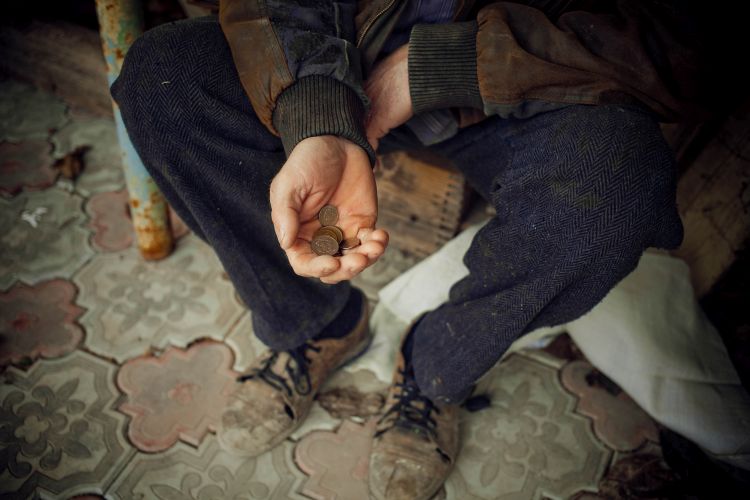
Take washing machines: the cheapest on John Lewis’ website is £229 and it will probably last 3 to 5 years so that’s at most about £75 a year plus electricity, which works out at about £1 per time you do load of washing. While it’s washing you can do something else.
Go to a launderette, and you are talking £7 a load plus you have to carry it all there and back and wait around while it’s going. Do 100 loads of washing a year and it’s £700 a year at the launderette, but only £175 if you have a washing machine. However, if you have a low income you probably can’t afford the £229 at one time to buy a washing machine.
An old Chinese philosopher once said ‘give a man a fish and you feed him for a day. Teach him how to fish and you feed him for a lifetime’. Loving our neighbour is like that too, teaching people to fish otherwise known as taking on the root causes of poverty in this case, but sometimes what they really need right now is a meal and to know that they are supported and cared for.
There is also a saying about recycling that can work here too. Not everyone is able to perfectly recycle everything possible but if everyone recycles a bit then as a whole that’s an awful lot of recycling. And in that way, we can’t end poverty in one simple way but if we all do a little bit that we will make a big change for many in poverty.
Joanne Mackin
Reflection from 18 February
Readings – Genesis 9: 8-17, Mark 1: 9-15 and 1 Peter 3: 18-22
Reflection on Genesis 9: 8-17 reading
Pictures of unstoppable torrents of water wrecking people’s homes and business premises, roads turned into uncontrollable rivers and fields of precious food crops saturated and wrecked have become common place. Events that were, at one time, unheard of or, at least, very unusual in this country have become frequent and we have been warned to expect more. We are told that human behaviour is a major cause.
Floods and their consequences we are now familiar with; but church baptism services have become less so. Things may be different in Uxbridge, but I cannot remember the last time I attended a baptism service at my own church.
Along with church weddings, what was once a reasonably frequent and happy occasion, for all the community to participate in, seems to have gone out of fashion. What, at one time, was a completely normal and expected rite of passage is now abnormal.
Although it used to be a common complaint of those who regularly attended church worship that those who came seeking baptism for their infant children, but were otherwise not seen in church, had little, if any, understanding as to what it was all about; I do wonder to what extent those who did regularly attend understood it either?
It is not immediately obvious to most people attending a church baptism service that a modest sprinkling of water on a young child’s head has a connection with the Biblical story of The Flood. The overwhelming force, chaos and devastating consequences of what we know to be the reality of a flood seems to be far removed from the carefully choregraphed symbolism and prescribed wording of the liturgy of a church baptism service.
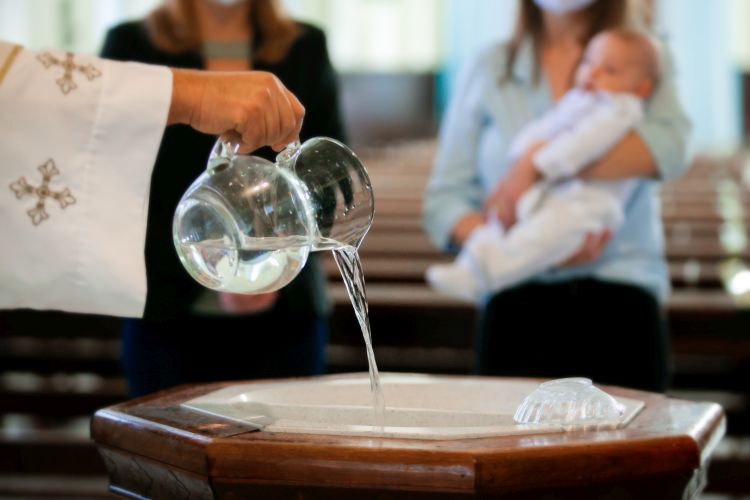
The reading which we have heard and the readings which we will hear today attempt to redress at least the questions of what it is all about?
They remind us that it is in the chaos, darkness and destruction of a catastrophic flood that baptism has its origins.
The devastating flood from which only Noah, his family and his selection of living creatures (Genesis 6:19) survived is represented by that modest sprinkling of water.
The young life being cradled in the arms of a loving parent, handed over to the minister and then safely returned to the parent following baptism is a life that is vulnerable and in need of protection from the consequences of human activity.
According to our reading from Genesis, it is the promise of God that “never again shall all flesh be cut off by the waters of a flood, and never again shall there be a flood to destroy the earth” (Genesis 9:11 NRSV).
The handing over and the handing back again is more than a ritual; it is an affirmation of both an awareness that life, lived by itself, is vulnerable and that human activity without God brings danger to that vulnerable life. It is also an acceptance of that promise of protection with God and the role of human agency in that.
Reflection on Mark 1: 9-15 reading
Enter a traditional Anglican or Catholic church and the baptismal font will be found close by as a visible sign of entrance into the Church. When Jesus came to Jordan to be baptised by John; it was at the point of entrance to his time of ministry. The baptism John offered, happened not in the safety of a building set aside for worship but in the open air, in the danger of a wild flowing river. It did not involve a symbolic sprinkling of water but an immersion in it; emergence from which felt like being saved from an imminent threat of drowning and required absolute trust in the person carrying out the baptism.
It was intended to be a sign of repentance – a public acknowledgement that life needed to be lived with God, in God’s way, and that however life had been lived previously; there was now a commitment to entrust one’s life to live in God’s way for the future. It was the entrance into a new way of living and Jesus’ own baptism by John was a sharing in this experience.
Powerful though the experience was, John had already told those he was baptising that he baptised with water but there was one who was coming who would baptise with the Holy Spirit (Mark 1: 7 & 8). This awareness of the coming of God’s Spirit to Jesus is seen by Mark as the start of the fulfilment of that prophecy.
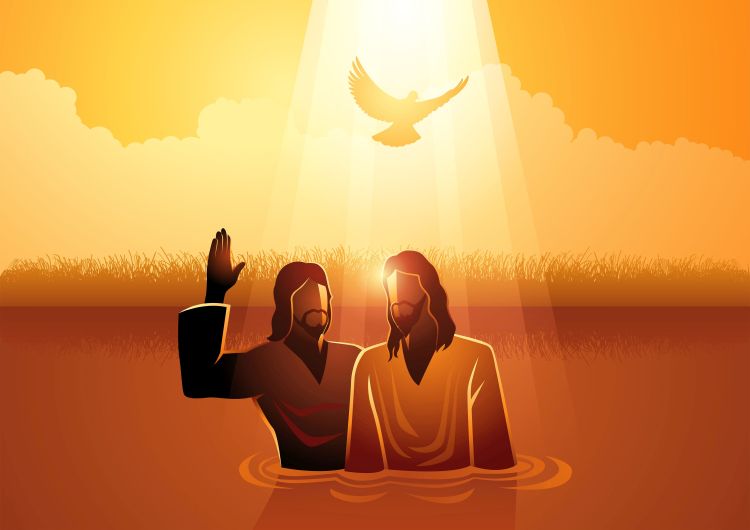
We are told that as he came out of the water into which he had been immersed; Jesus experienced God’s Spirit descending on him (Mark 1:11). With the coming of God’s Spirit on Jesus and the heavenly words of affirmation which are heard: “you are my Son, the Beloved, with you I am well pleased” (Mark 1: 11 NRSV) God is seen by Mark as putting his faith and trust in this carpenter’s son from the small town of Nazareth. The question now is who else will?
Who else will experience the start of a new way of living in which it is not just one human entering into a commitment to live a different, better, life through a symbolic act; but one human who trusts and accepts the baptism Jesus offers and through that is aware of God’s Spirit within; enabling him or her to live that different life?
The good news presented in Mark is of life which is more than one kept safe from harm sheltered by the protection of God. It is of a life of action positively seeking to live in a godly way which benefits not just that one person but those that one person comes into contact with too.
It is of a life in which the protection of God does not prevent wilderness experiences or other experiences of the harms that are part of human life; but in which those harms are not the end of life but, in the trustworthy arms of God, are triumphed over in resurrection life.
Reflection on 1 Peter 3: 18 – 22 reading
We may hear the readings for Lent from the Hebrew scriptures and the Gospel accounts in a similar way to the way we might hear the stories in Mallory’s Le Morte d’Arthur. Tales that tell of a past time and heroic people of the time and how they experienced it. Tales which are handed down through generations and which say something about the community of which we are now part and the shared past that we inherit.
But the author of our Epistle reading, believed to be writing to Christians living at the end of the first century, very specifically links the story of The Flood and the Gospel message to what his readers lived experience is of what is involved in living as a Christian, or as a Christian community, within a society that does not trust and accept the way of Jesus as the way to live. An experience which could be overwhelming and threatening to life itself.
Today, we read the Epistle in conditions which have issues in common with what Christians were experiencing at the time the Epistle was written. In doing so, it links us to their lived experience and we recognise that the writer is saying things that address our situation.
In particular, he is calling on us to see our baptism (something that may have happened a long time ago – perhaps, even, before we were conscious of it and/or now have a recollection of it) as something that marks the entrance of us into our life as Christians and, with it that affirms to us that however much we may feel overwhelmed by events that threaten to drown us and extinguish our life, God is with us and saves us “through the resurrection of Jesus Christ” (1 Peter 3: 21 NRSV) as, in the Genesis story, Noah and his family were saved in a resurrection experience; as, in the Gospel account, Jesus and those who also underwent John’s baptism were symbolically saved in a resurrection experience.
Today, the First Sunday of Lent, as we enter this time of reflection on the life of Christ and our own lives, and with it a time of repentance; we start with where it started for us: with baptism and with understanding what we, and possibly also those who brought us for baptism, may not have understood at the time and the hope that is found in and founded upon that.
Richard Reid
Readings for 25 February
Genesis 17: 1-7, 15-16
When Abram was ninety-nine years old, the Lord appeared to him and said, “I am God Almighty; walk before me faithfully and be blameless. 2 Then I will make my covenant between me and you and will greatly increase your numbers.”
3 Abram fell facedown, and God said to him, 4 “As for me, this is my covenant with you: You will be the father of many nations. 5 No longer will you be called Abram; your name will be Abraham, for I have made you a father of many nations. 6 I will make you very fruitful; I will make nations of you, and kings will come from you. 7 I will establish my covenant as an everlasting covenant between me and you and your descendants after you for the generations to come, to be your God and the God of your descendants after you.
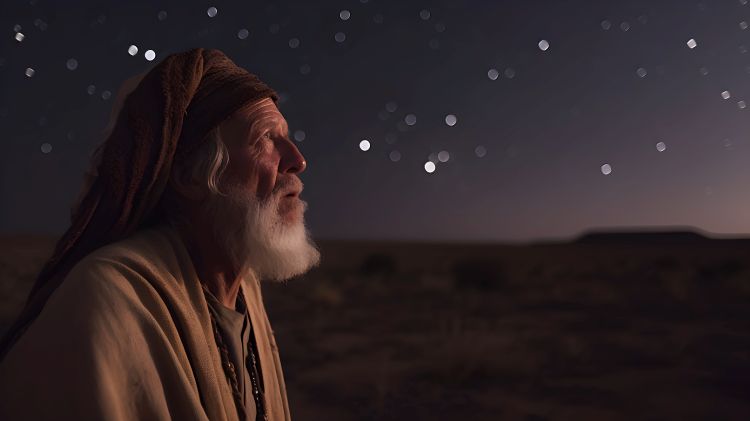
15 God also said to Abraham, “As for Sarai your wife, you are no longer to call her Sarai; her name will be Sarah. 16 I will bless her and will surely give you a son by her. I will bless her so that she will be the mother of nations; kings of peoples will come from her.”
Further readings from the lectionary this week are as follows:
- Mark 8: 31-38
- Psalm 22: 23-31
- Romans 4: 13-38
Our worship
We meet at 11am for our Sunday services, which are also live-streamed on our Facebook page. If you wish to view our services online, you can find them at www.facebook.com/christchurchuxbridge. You do not have to be a Facebook user to watch them – our services are publicly viewable. You can also view a recent service on our church website. Our service this week will be a communion service with reception of new member, Beth, and will be led by URC minister, Revd Dr Elizabeth Welch. You can find the order of service here.
If you are unable to join us in person or online for our Sunday services, but would like to receive a recording of them on a memory stick to watch at home, please let us know.
Forthcoming services
25 February – Revd Dr Elizabeth Welch (URC minister) – Holy Communion and reception of new member
3 March – Joanne Davies (Methodist local preacher)
10 March – Christ Church worship group – parade service (Mothering Sunday)
17 March – Revd Margaret Dudley (Methodist minister)
Church charity news
Church charity coffee mornings
There will be coffee mornings to raise money for Communicare Counselling Service on the following dates:
Saturday 24 February
Saturday 9 March
Saturday 30 March
Saturday 13 April
You can find more details about Communicare Counselling Service, our church charity for 2023 at:
https://christchurchuxbridge.org.uk/activities/churchcharity2023
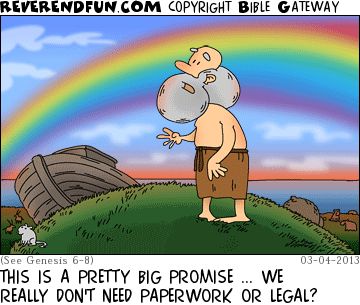
World Day of Prayer
Friday 1 March, 2pm at St Margaret’s Church
This year’s World Day of Prayer service will be held on Friday 1 March at 2pm at St Margaret’s Church, Windsor Street, Uxbridge. The service this year has been put together by Christian women in Palestine and the theme is ‘I beg you, bear with one another in love’.
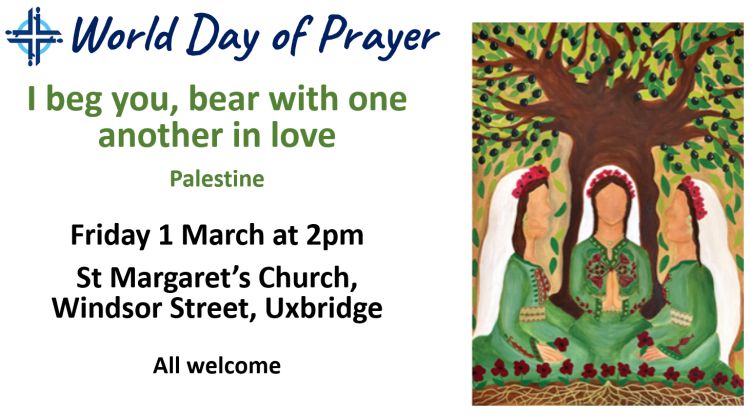
One Hillingdon Worship Night
Saturday 2 March, 6.30pm – 8.00pm, St Margaret’s
Dear friends,
We’re excited to share that the Uxbridge Parish will be hosting the One Hillingdon Worship Night, a special event tailored specifically for the youth in our area. It’s set to take place on Saturday 2nd March, from 6:30 PM to 8:00 PM at St. Margaret’s Church in Uxbridge.
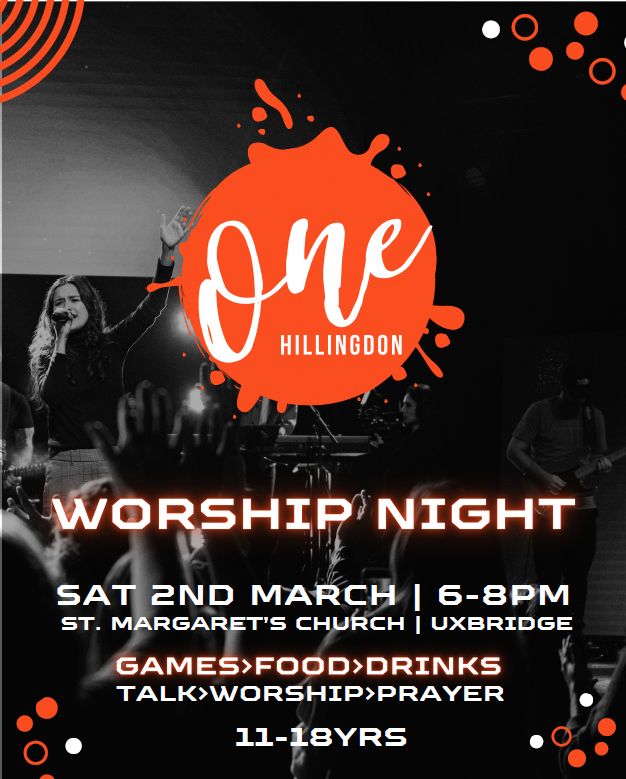
We’ll kick off the evening with doors opening at 6:30 PM, allowing young people to drop in and enjoy some games, drinks, and snacks. The main service will begin promptly at 7:00 PM with a time of uplifting worship, followed by an engaging talk.
We warmly invite you to join us, along with the young people from your churches, for what promises to be an inspiring and joy-filled evening of praising and celebrating Jesus together.
Looking forward to sharing this wonderful experience with you all!
Alessandra Bazzo
Children and Youth Minister, Uxbridge Parish
Hillingdon u3a Singers concert
Welcome Spring
Sunday 24 March, 5pm at Christ Church
Hillingdon u3a Singers present ‘Welcome Spring’ – a concert with songs by Hillingdon u3a Singers featuring additional items by Hillingdon u3a Guitar Group and Hillingdon u3a Ukelele Group. Tickets cost £10 for adults (£3 children) and are available from members of the groups or on the door before the performance.
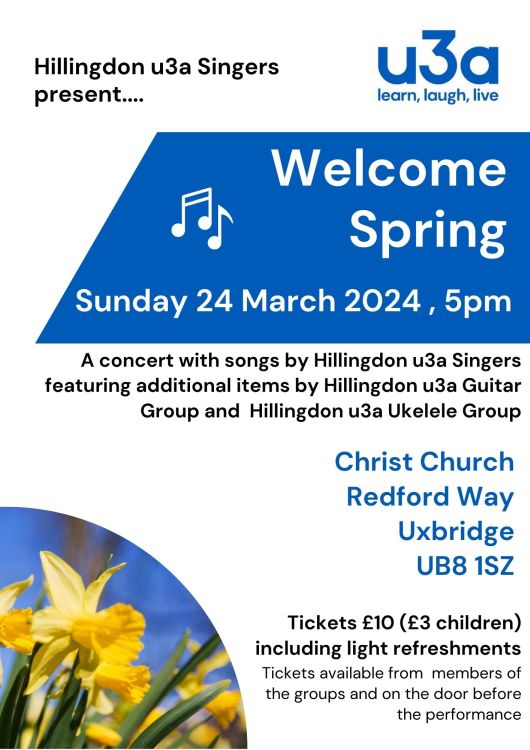
Dates for your diary
| 1 March | World Day of Prayer |
| 2 March | One Hillingdon Worship Night |
| 6 March | Welcome Wednesdays |
| 20 March | Welcome Wednesdays |
| 24 March | Welcome Spring concert |
| 29 March | Good Friday Walk of Witness |
| 3 April | Welcome Wednesdays |
| 17 April | Welcome Wednesdays |
| 19 May | Congregational Meeting |
| 8 September | Congregational Meeting |
| 24 November | Congregational Meeting |
Children’s Corner
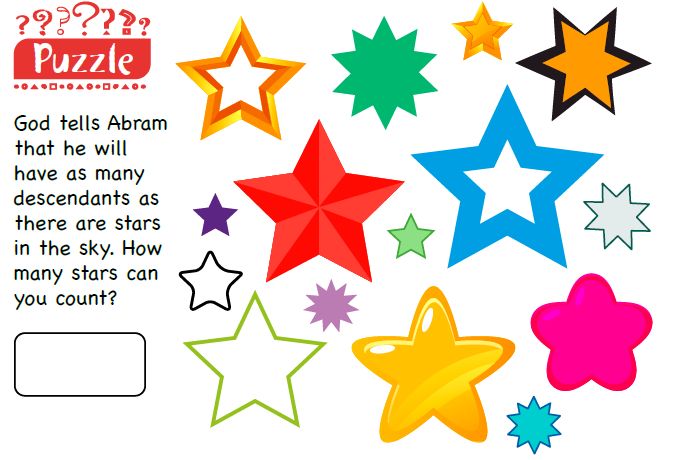
Praying for other churches
This week we hold all the churches in the Harrow and Hillingdon Methodist Circuit in our prayers.
Closing prayer
Loving God,
Thank you for the wonderful times,
when our hearts are singing.
Thank you also,
that you are with us in the difficult times,
when we are confused and don’t understand.
Help us to feel your presence – at all times.
Help us to hear your guidance and learn to trust you,
knowing that good times will come again.
Amen.
(Taken from Roots)
